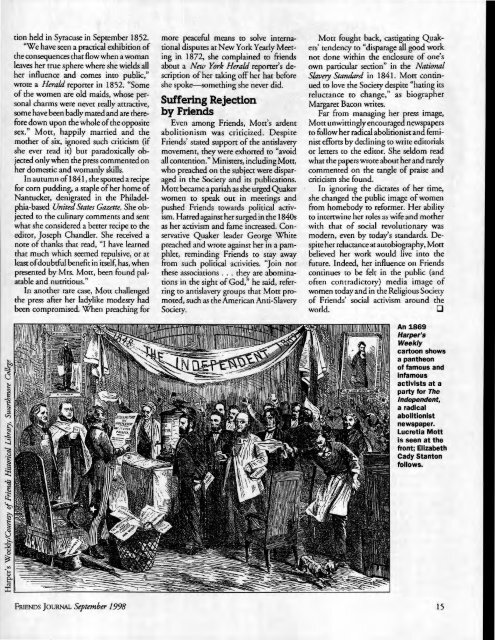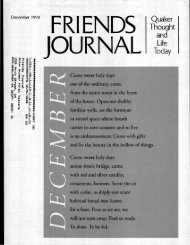Quaker Thought and Today - Friends Journal
Quaker Thought and Today - Friends Journal
Quaker Thought and Today - Friends Journal
You also want an ePaper? Increase the reach of your titles
YUMPU automatically turns print PDFs into web optimized ePapers that Google loves.
cion held in Syracuse in September 1852.<br />
"We have seen a practical exhibition of<br />
the consequences that flow when a woman<br />
leaves her true sphere where she wields all<br />
her influence <strong>and</strong> comes into public,"<br />
wrote a Herald reponer in 1852. "Some<br />
of the women are old maids, whose personal<br />
charms were never really attractive,<br />
some have been badly mated <strong>and</strong> are therefore<br />
down upon the whole of the opposite<br />
sex." Mott, happily married <strong>and</strong> the<br />
mother of six, ignored such criticism (if<br />
she ever read it) but paradoxically objected<br />
only when the press commented on<br />
her domestic <strong>and</strong> womanly skills.<br />
In autumn of 1841, she spotted a recipe<br />
for com pudding, a staple of her home of<br />
Nantucket, denigrated in the Philadelphia-based<br />
United States Gazette. She objected<br />
to the culinary comments <strong>and</strong> sent<br />
what she considered a better recipe to the<br />
editor, Joseph Ch<strong>and</strong>ler. She received a<br />
note of thanks that read, "I have learned<br />
that much which seemed repulsive, or at<br />
least of doubtful benefit in itself, has, when<br />
presented by Mrs. Mott, been found palatable<br />
<strong>and</strong> nutritious."<br />
In another rare case, Mott challenged<br />
the press after her ladylike modesty had<br />
been compromised. When preaching for<br />
FRIENDS JoURNAL September 1998<br />
more peaceful means to solve international<br />
disputes at New York Yearly Meeting<br />
in 1872, she complained to friends<br />
about a New York Herald reporter's description<br />
of her taking off her hat before<br />
she spoke-something she never did.<br />
Suffering Rejection<br />
by <strong>Friends</strong><br />
Even among <strong>Friends</strong>, Mort's ardent<br />
abolitionism was criticized. Despite<br />
<strong>Friends</strong>' stated suppon of the antislavery<br />
movement, they were exhoned to "avoid<br />
all contention." Ministers, including Mott,<br />
who preached on the subject were disparaged<br />
in the Society <strong>and</strong> its publications.<br />
Mott became a pariah as she urged <strong>Quaker</strong><br />
women to speak our in meetings <strong>and</strong><br />
pushed <strong>Friends</strong> towards political activism.<br />
Hatred against her surged in the 1840s<br />
as her activism <strong>and</strong> fame increased. Conservative<br />
<strong>Quaker</strong> leader George White<br />
preached <strong>and</strong> wrote against her in a pamphlet,<br />
reminding <strong>Friends</strong> to stay away<br />
from such political activities. "Join not<br />
these associations . .. they are abominations<br />
in the sight of God," he said, referring<br />
to antislavery groups that Mott promoted,<br />
such as the American Anti-Slavery<br />
Society.<br />
Mott fought back, castigating <strong>Quaker</strong>s'<br />
tendency to "disparage all good work<br />
not done within the enclosure of one's<br />
own particular section" in the National<br />
Slavery St<strong>and</strong>ard in 1841. Mott continued<br />
to Jove the Society despite "hating its<br />
reluctance to change," as biographer<br />
Margaret Bacon writes.<br />
Far from managing her press image,<br />
Mott unwittingly encouraged newspapers<br />
to follow her radical abolitionist <strong>and</strong> feminist<br />
efforts by declining to write editorials<br />
or letters to the editor. She seldom read<br />
what the papers wrote about her <strong>and</strong> rarely<br />
commented on the tangle of praise <strong>and</strong><br />
criticism she found.<br />
In ignoring the dictates of her time,<br />
she changed the public image of women<br />
from homebody to reformer. Her ability<br />
to intertwine her roles as wife <strong>and</strong> mother<br />
with that of social revolutionary was<br />
modern, even by today' s st<strong>and</strong>ards. Despite<br />
her reluctance at autobiography, Mott<br />
believed her work would live into the<br />
future. Indeed, her influence on <strong>Friends</strong><br />
continues to be felt in the public (<strong>and</strong><br />
often contradictory) media image of<br />
women today <strong>and</strong> in the Religious Society<br />
of <strong>Friends</strong>' social activism around the<br />
world. 0<br />
An 1869<br />
Harper's<br />
Weekly<br />
cartoon shows<br />
a pantheon<br />
of famous <strong>and</strong><br />
Infamous<br />
activists at a<br />
party for The<br />
Independent,<br />
a radical<br />
abolitionist<br />
newspaper.<br />
Lucretia Mott<br />
Is seen at the<br />
front; Elizabeth<br />
Cady Stanton<br />
follows.<br />
15






